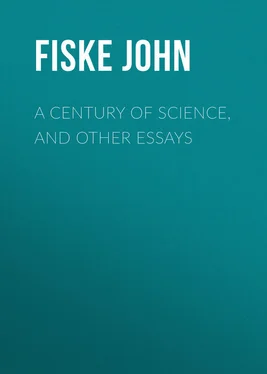John Fiske - A Century of Science, and Other Essays
Здесь есть возможность читать онлайн «John Fiske - A Century of Science, and Other Essays» — ознакомительный отрывок электронной книги совершенно бесплатно, а после прочтения отрывка купить полную версию. В некоторых случаях можно слушать аудио, скачать через торрент в формате fb2 и присутствует краткое содержание. Жанр: foreign_antique, foreign_prose, на английском языке. Описание произведения, (предисловие) а так же отзывы посетителей доступны на портале библиотеки ЛибКат.
- Название:A Century of Science, and Other Essays
- Автор:
- Жанр:
- Год:неизвестен
- ISBN:нет данных
- Рейтинг книги:3 / 5. Голосов: 1
-
Избранное:Добавить в избранное
- Отзывы:
-
Ваша оценка:
- 60
- 1
- 2
- 3
- 4
- 5
A Century of Science, and Other Essays: краткое содержание, описание и аннотация
Предлагаем к чтению аннотацию, описание, краткое содержание или предисловие (зависит от того, что написал сам автор книги «A Century of Science, and Other Essays»). Если вы не нашли необходимую информацию о книге — напишите в комментариях, мы постараемся отыскать её.
A Century of Science, and Other Essays — читать онлайн ознакомительный отрывок
Ниже представлен текст книги, разбитый по страницам. Система сохранения места последней прочитанной страницы, позволяет с удобством читать онлайн бесплатно книгу «A Century of Science, and Other Essays», без необходимости каждый раз заново искать на чём Вы остановились. Поставьте закладку, и сможете в любой момент перейти на страницу, на которой закончили чтение.
Интервал:
Закладка:
As soon as this statement was made by Wallace, it seemed to me to open up an entirely new world of speculation. There was this enormous antiquity of man, during the greater part of which he did not know enough to make history. We see man existing here on the earth, no one can say how long, but surely many hundreds of thousands of years, yet only during just the last little fringe of four or five thousand years has he arrived at the point where he makes history. Before that, something was going on, a great many things were going on, while his ancestors were slowly growing up to that point of intelligence where it began to make itself felt in the recording of events. This agrees with Wallace's suggestion of a long period of psychical change, accompanied by slight physical change.
Well, in the spring of 1871, when Darwin's "Descent of Man" came out, just about the same time I happened to be reading Wallace's account of his experiences in the Malay Archipelago, and how at one time he caught a female orang-outang with a new-born baby, and the mother died, and Wallace brought up the baby orang-outang by hand; and this baby orang-outang had a kind of infancy which was a great deal longer than that of a cow or a sheep, but it was nothing compared to human infancy in length. This little orang-outang could not get up and march around, as mammals of less intelligence do, when he was first born, or within three or four days; but after three or four weeks or so he would get up, and begin taking hold of something and pushing it around, just as children push a chair; and he went through a period of staring at his hands, as human babies do, and altogether was a good deal slower in getting to the point where he could take care of himself. And while I was reading of that I thought, Dear me! if there is any one thing in which the human race is signally distinguished from other mammals, it is in the enormous duration of their infancy; but it is a point that I do not recollect ever seeing any naturalist so much as allude to.
It happened at just that time that I was making researches in psychology about the organization of experiences, the way in which conscious intelligent action can pass down into quasi-automatic action, the generation of instincts, and various allied questions; and I thought, Can it be that the increase of intelligence in an animal, if carried beyond a certain point, must necessarily result in prolongation of the period of infancy, – must necessarily result in the birth of the mammal at a less developed stage, leaving something to be done, leaving a good deal to be done, after birth? And then the argument seemed to come along very naturally, that for every action of life, every adjustment which a creature makes in life, whether a muscular adjustment or an intelligent adjustment, there has got to be some registration effected in the nervous system, some line of transit worn for nervous force to follow; there has got to be a connection between certain nerve-centres before the thing can be done, whether it is the acts of the viscera or the acts of the limbs, or anything of that sort; and of course it is obvious that if the creature has not many things to register in his nervous system, if he has a life which is very simple, consisting of few actions that are performed with great frequency, that animal becomes almost automatic in his whole life; and all the nervous connections that need to be made to enable him to carry on life get made during the fœtal period or during the egg period, and when he comes to be born, he comes all ready to go to work. As one result of this, he does not learn from individual experience, but one generation is like the preceding generations, with here and there some slight modifications. But when you get the creature that has arrived at the point where his experience has become varied, he has got to do a good many things, and there is more or less individuality about them; and many of them are not performed with the same minuteness and regularity, so that there does not begin to be that automatism within the period during which he is being developed and his form is taking on its outlines. During prenatal life there is not time enough for all these nervous registrations, and so by degrees it comes about that he is born with his nervous system perfectly capable only of making him breathe and digest food, – of making him do the things absolutely requisite for supporting life; instead of being born with a certain number of definite developed capacities, he has a number of potentialities which have got to be roused according to his own individual experience. Pursuing that line of thought, it began after a while to seem clear to me that the infancy of the animal in a very undeveloped condition, with the larger part of his faculties in potentiality rather than in actuality, was a direct result of the increase of intelligence, and I began to see that now we have two steps: first, natural selection goes on increasing the intelligence; and secondly, when the intelligence goes far enough, it makes a longer infancy, a creature is born less developed, and therefore there comes this plastic period during which he is more teachable. The capacity for progress begins to come in, and you begin to get at one of the great points in which man is distinguished from the lower animals, for one of those points is undoubtedly his progressiveness; and I think that any one will say, with very little hesitation, that if it were not for our period of infancy we should not be progressive. If we came into the world with our capacities all cut and dried, one generation would be very much like another.
Then, looking round to see what are the other points which are most important in which man differs from the lower animals, there comes that matter of the family. The family has adumbrations and foreshadowings among the lower animal, but in general it may be said that while mammals lower than man are gregarious, in man have become established those peculiar relationships which constitute what we know as the family; and it is easy to see how the existence of helpless infants would bring about just that state of things. The necessity of caring for the infants would prolong the period of maternal affection, and would tend to keep the father and mother and children together, but it would tend especially to keep the mother and children together. This business of the marital relations was not really a thing that became adjusted in the primitive ages of man, but it has become adjusted in the course of civilization. Real monogamy, real faithfulness of the male parent, belongs to a comparatively advanced stage; but in the early stages the knitting together of permanent relations between mother and infant, and the approximation toward steady relations on the part of the male parent, came to bring the family, and gradually to knit those organizations which we know as clans.
Конец ознакомительного фрагмента.
Текст предоставлен ООО «ЛитРес».
Прочитайте эту книгу целиком, купив полную легальную версию на ЛитРес.
Безопасно оплатить книгу можно банковской картой Visa, MasterCard, Maestro, со счета мобильного телефона, с платежного терминала, в салоне МТС или Связной, через PayPal, WebMoney, Яндекс.Деньги, QIWI Кошелек, бонусными картами или другим удобным Вам способом.
1
Morse, What American Zoölogists have done for Evolution , pp. 37, 39-41, Salem, 1876; Proc. Amer. Assoc. for Adv. of Sci. , vol. xxii.
Читать дальшеИнтервал:
Закладка:
Похожие книги на «A Century of Science, and Other Essays»
Представляем Вашему вниманию похожие книги на «A Century of Science, and Other Essays» списком для выбора. Мы отобрали схожую по названию и смыслу литературу в надежде предоставить читателям больше вариантов отыскать новые, интересные, ещё непрочитанные произведения.
Обсуждение, отзывы о книге «A Century of Science, and Other Essays» и просто собственные мнения читателей. Оставьте ваши комментарии, напишите, что Вы думаете о произведении, его смысле или главных героях. Укажите что конкретно понравилось, а что нет, и почему Вы так считаете.












